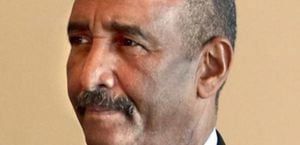A recently emerged hot mic incident has ignited controversy involving Rep. Dan Crenshaw (R-Texas) and former Fox News host Tucker Carlson. While speaking with Steven Edginton of GB News, Crenshaw was caught on camera making threatening remarks about Carlson, stating, "If I ever meet him, I’ll fucking kill him." This incendiary comment is now stirring outrage among commentators and political figures alike.
The exchange occurred during the wrapping up of Crenshaw's interview, after he was asked about his relationship with Carlson. The hot mic caught him expressing contempt for Carlson, labeling him "the worst person" and indicating hostility due to their opposing views. Edginton shared the now-deleted clip from the interview which quickly went viral, prompting reactions on social media from various quarters.
The fallout from Crenshaw's comments was immediate. Marjorie Taylor Greene (R-Ga.) took to social media to question whether Crenshaw had truly threatened Carlson, to which the Texas lawmaker replied, "Lol, no." Meanwhile, Elon Musk chimed in, asking why Crenshaw seemed "homicidal" toward Carlson, adding to the swirling controversy surrounding the incident.
On his part, Tucker Carlson responded. Following the emergence of the hot mic video, he invited Crenshaw for a face-to-face interview, stating, "Why don’t you come sit for an interview and we’ll see how you do? I’ll send you my address." This has added another layer of complexity to the feud, with Carlson challenging the very essence of Crenshaw's remarks and casting doubt on his character.
The backdrop to this clash is rooted firmly within their previous disagreements centered on foreign policy, particularly U.S. aid to Ukraine. Crenshaw has been vocal about his support for assisting Ukraine amid its conflict with Russia, whereas Carlson has consistently criticized such initiatives, claiming the consensus misses the mark on America’s best interests. Throughout their years of public sparring, Carlson has unflinchingly referred to Crenshaw using derogatory nicknames like "Eyepatch McCain" due to his war injuries, making their relationship particularly strained.
During the GB News interview, Crenshaw also remarked, "Tucker doesn’t know what he’s talking about," as he addressed Carlson’s criticisms of U.S. aid to Ukraine, saying those who think like Carlson are misguided at best. He pointed to Carlson's prior comments made during his visit to Moscow with Russian President Vladimir Putin, where Carlson praised the grocery prices, highlighting the disconnect he perceives between Carlson’s viewpoints and the realities faced by the U.S.
The heavy backlash against Crenshaw’s hot mic remarks has touched on broader themes concerning the tone and behavior expected from elected officials, especially when it involves threats of violence. One social media user characterized the comments as "terroristic," calling for accountability and consequences for such statements by a standing congressman.
Conservative commentator Alex Stein criticized Crenshaw harshly by stating, "Forget about whatever political party he’s a part of, this shows you how insensitive Dan Crenshaw truly is. Him saying this, it just shows you he’s a very callous individual who does not value human life.”
This level of public engagement is significant considering how polarized the American political climate has become, especially within the Republican Party, where internal critiques are now commonplace. Many commenters indicated their frustration with Crenshaw's approach, signaling diminishing support within his constituency, as one user noted, "I live in Crenshaw’s district and I know for a fact the Republican Party is losing faith in him. His time is done."
The engagement on social media and by political figures reflects how this moment has catalyzed discussions around propriety, accountability, and the nature of political discourse. Crenshaw's incident is emblematic of larger issues where extreme remarks become normalized and could redefine dialogue within partisan divides.
Crenshaw himself has yet to fully address the magnitude of the consequences his words may invoke. While he presently maintains he did not threaten Carlson, the outcry around this incident may compel him to navigate the uncharted waters of public perception and his standing within the GOP. The invitation from Carlson presents both a challenge and opportunity to clarify their perspectives amid the battlefield of partisan rhetoric. This standoff could lead to either heightened tensions or possibly unexpected reconciliations during their anticipated engagement.
Events following the hot mic moment serve as poignant reminders of the fervor within American political dialogues and how such conversations shape the political narrative. With the public intensely observing Crenshaw's next steps, this situation embodies the complexity of maintaining civility and effectiveness within the increasingly contentious arena of American politics.
Given the current dynamics involved, how Crenshaw responds to Carlson’s challenge will undoubtedly prompt reactions across the political spectrum and could heavily influence his political future as adversarial voices continue to emerge from both supporters and detractors.



